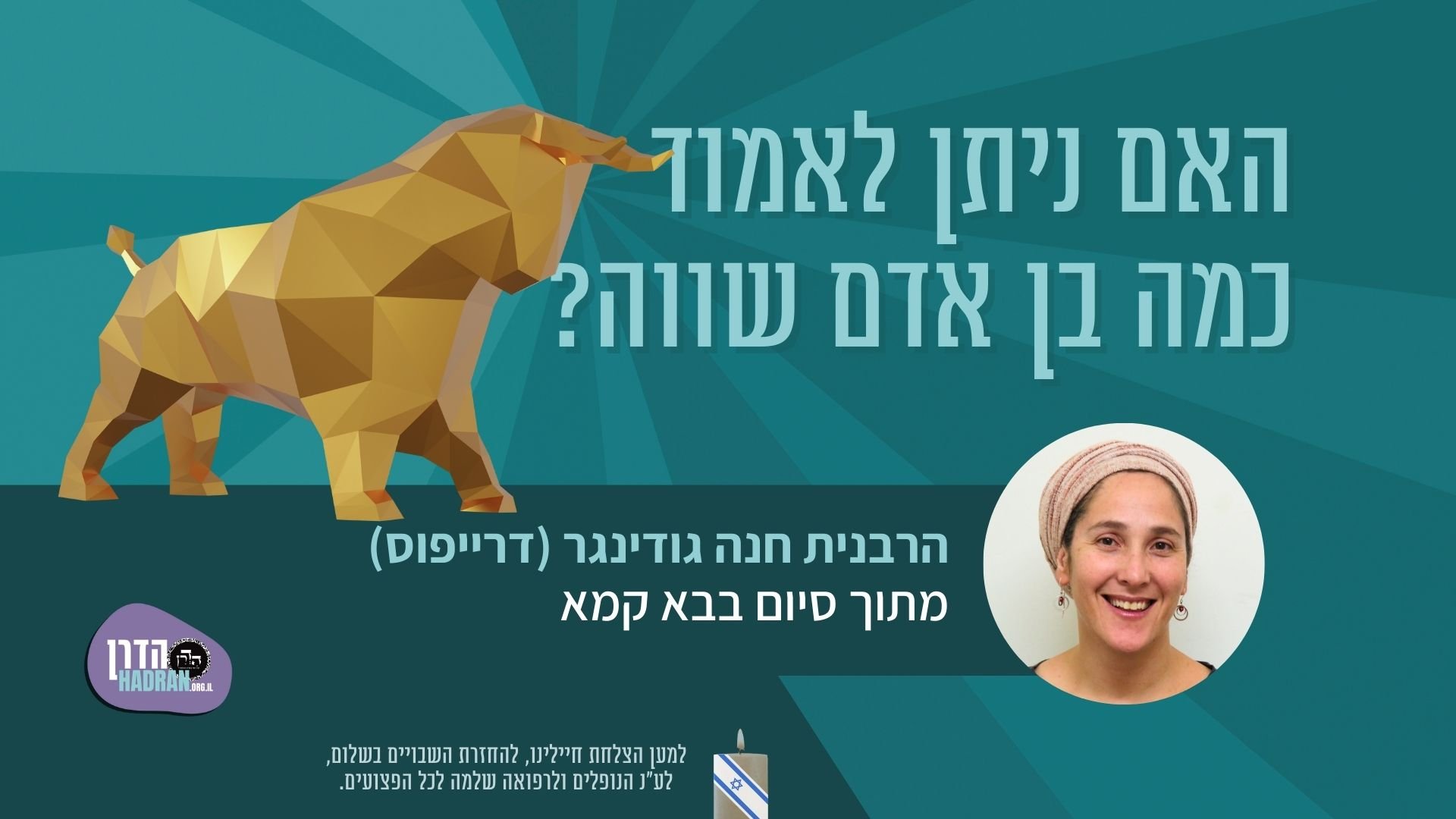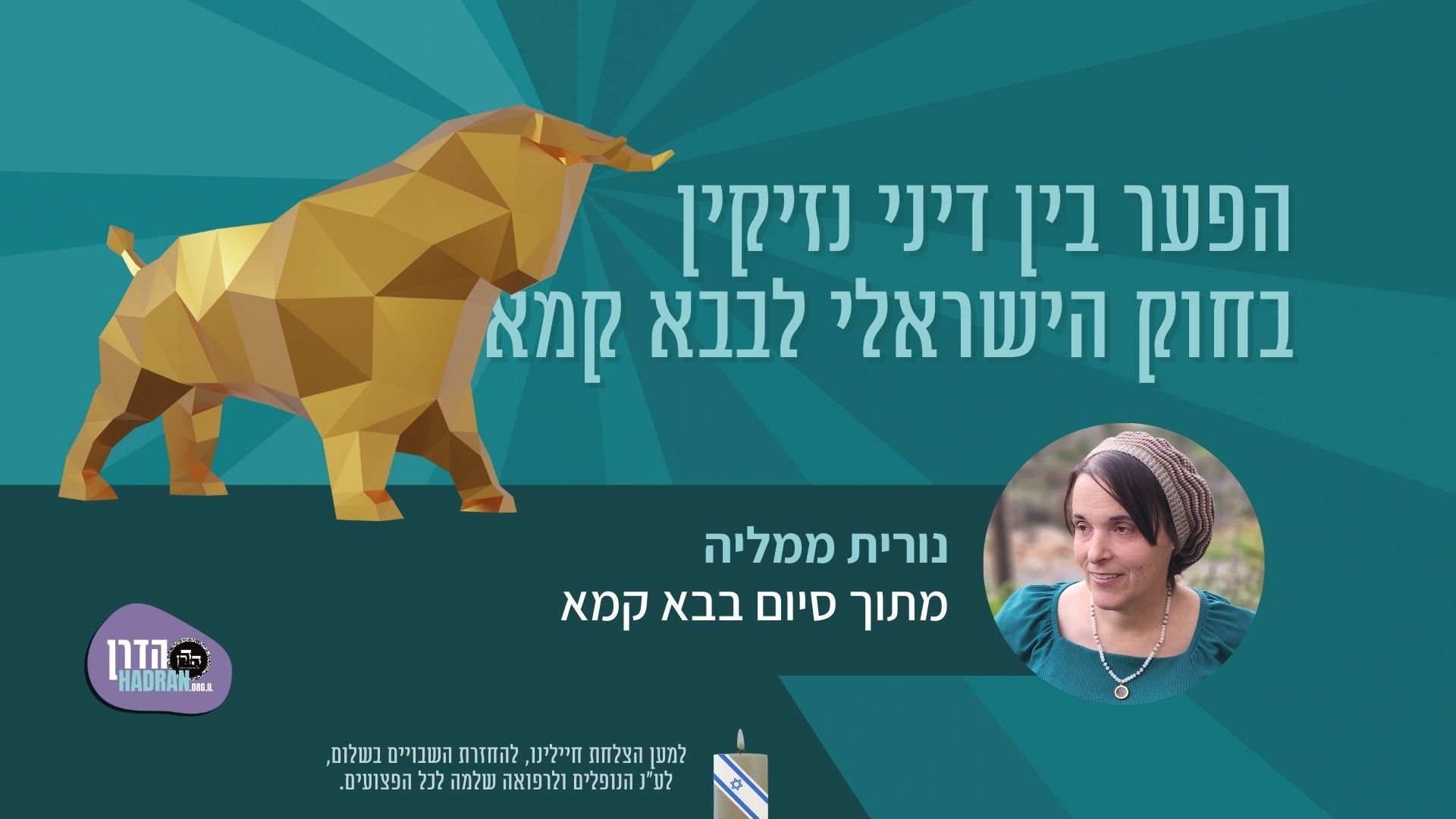בבא קמא קיג
אֲבָל אִיתֵיהּ בְּמָתָא – לָא; דְּאָמְרִינַן: אֵימַר לָא אֲמַרוּ לֵיהּ, דְּאָמְרִי: (אַשְׁכְּחִינְהוּ) [אַשְׁכְּחֵיהּ] שְׁלִיחָא דְּבֵית דִּין, וַאֲמַר לֵיהּ.
But if the defendant is in the city, the court does not ostracize him for failing to respond to a summons conveyed through a woman or a neighbor, as we say: Perhaps they did not tell him of the court’s summons, as they said to themselves: Since the defendant is in the city, a court agent has already found him and told him. As a result, these unofficial messengers will not deliver the court’s summons to the defendant at all.
וְלָא אֲמַרַן אֶלָּא דְּלָא חָלֵיף אַבָּבָא דְּבֵי דִּינָא, אֲבָל חָלֵיף אַבָּבָא דְּבֵי דִינָא – לָא; אָמְרִי: אַשְׁכְּחוּהּ בֵּי דִינָא, וְאָמְרִי לֵיהּ.
And similarly, we said that the court will ostracize one who does not respond to a summons conveyed through a woman or a neighbor only in a case where he does not pass by the court’s entrance on his way home, but if he does pass by the court’s entrance, the court does not ostracize him. This is because it is possible that the unofficial messengers will say to themselves: Since he passes by the courthouse, the court has already found him and told him.
וְלָא אֲמַרַן אֶלָּא דְּאָתֵי בְּיוֹמֵיהּ, אֲבָל לָא אָתֵי בְּיוֹמֵיהּ – לָא; אֵימָא אִישְׁתְּלוֹיֵי אִשְׁתְּלִי.
And furthermore, we said that the court will ostracize one who does not respond to a summons only in a case where he comes home on the same day that the woman or neighbor is sent to deliver the court summons. But if he does not come home on the same day, he is not ostracized, because it is possible to say that they forgot to notify him.
אָמַר רָבָא: הַאי מַאן דִּכְתִיב עֲלֵיהּ פְּתִיחָא עַל דְּלָא אָתֵי לְדִינָא – עַד דְּאָתֵי לְדִינָא, לָא מְקָרְעִינַן לֵיהּ. עַל דְּלָא צָיֵית לְדִינָא – עַד דְּצָיֵית, לָא מְקָרְעִינַן לֵיהּ. וְלָא הִיא, כֵּיוָן דְּאָמַר: ״צָיֵיתְנָא״ – קָרְעִינַן לֵיהּ.
Rava said: With regard to one who had a document of ostracism written about him due to the fact that he did not come to court, we do not tear up the document for him until he actually comes to court, and it is not enough for him to simply commit to appearing. Similarly, if the document of ostracism was written due to the fact that he did not obey the ruling of the court, we do not tear it up for him until he actually obeys the ruling. The Gemara comments: This second statement is not so. Rather, once he has acquiesced and said: I will obey, we immediately tear up the document for him.
אָמַר רַב חִסְדָּא: קוֹבְעִים זְמַן שֵׁנִי וַחֲמִישִׁי וְשֵׁנִי – זִמְנָא וְזִמְנָא בָּתַר זִמְנָא, וּלְמָחָר כָּתְבִינַן.
Rav Ḥisda said: The court sets a date for an individual to appear in court on the upcoming Monday. And if he does not appear, they set a date for that Thursday, and if he does not appear, they set a date for the following Monday, so that he has a second date and then a third date after the first date. And if he does not appear in court by the third date, then on the next day we write a document of ostracism.
רַב אַסִּי אִיקְּלַע בֵּי רַב כָּהֲנָא. חֲזָא הָהִיא אִיתְּתָא דְּאַזְמְנַהּ לְדִינָא בְּפַנְיָא, וּבְצַפְרָא כְּתֻיב עֲלַהּ פְּתִיחָא. אֲמַר לֵיהּ, לָא סָבַר לַהּ מָר לְהָא דְּאָמַר רַב חִסְדָּא: קוֹבְעִין זְמַן שֵׁנִי וַחֲמִישִׁי וְשֵׁנִי?
The Gemara relates that Rav Asi happened to come to the house of Rav Kahana. He saw that there was a certain woman whom Rav Kahana had summoned to appear in court in the evening, but she did not appear, and in the morning Rav Kahana wrote a document of ostracism concerning her. Rav Asi said to him: Does the Master not hold in accordance with that which Rav Ḥisda says, that the court sets a date for the coming Monday, and then Thursday, and then the following Monday before it issues a document of ostracism?
אֲמַר לֵיהּ: הָנֵי מִילֵּי גַּבְרָא, דַּאֲנִיס וְלֵיתֵיהּ בְּמָתָא; אֲבָל אִיתְּתָא, כֵּיוָן דְּאִיתַהּ בְּמָתָא וְלָא אָתְיָא – מוֹרֶדֶת הִיא.
Rav Kahana said to him: That matter applies only with regard to a man, as he is a victim of circumstance and is not always in the city due to his vocational activities. But in the case of a woman, since she is always in the city, when she does not come to court the first time she is immediately considered rebellious, and the court may issue a document of ostracism right away.
אָמַר רַב יְהוּדָה: לָא (יָהֲבִינָא) [יָהֲבִינַן] זִמְנָא לָא בְּיוֹמֵי נִיסָן וְלָא בְּיוֹמֵי תִּשְׁרֵי, לָא בְּמַעֲלֵי יוֹמָא טָבָא וְלָא בְּמַעֲלֵי שַׁבְּתָא. אֲבָל מִנִּיסָן לְבָתַר יוֹמֵי נִיסָן, וּבְיוֹמֵי תִּשְׁרֵי לְבָתַר תִּשְׁרֵי – קָבְעִינַן. מִמַּעֲלֵי שַׁבְּתָא לְבָתַר מַעֲלֵי שַׁבְּתָא – לָא קָבְעִינַן. מַאי טַעְמָא? בַּעֲבִידְתֵּיהּ דְּשַׁבְּתָא טְרִיד.
Continuing the discussion of court dates, Rav Yehuda says: The court does not set a date for legal proceedings during the days of Nisan, nor during the days of Tishrei, and also not on the eve of a Festival nor the eve of Shabbat because these are busy times. But during Nisan we may set a court date to take place after Nisan, and likewise, during Tishrei we may set a court date to take place after Tishrei. By contrast, on the eve of Shabbat we do not set a court date to take place after the eve of Shabbat. What is the reason for this? It is because one is preoccupied with his work in preparation for Shabbat and it is possible that he will forget about the court summons.
אָמַר רַב נַחְמָן: לָא יָהֲבִינַן זִמְנָא לָא לִבְנֵי כַלָּה בְּכַלָּה, וְלָא לִבְנֵי רִיגְלָא בְּרִיגְלָא. כִּי הֲווֹ אָתוּ לְקַמֵּיהּ דְּרַב נַחְמָן, אֲמַר לְהוּ: וְכִי לְדִידְכוּ כִּנּוּפַיְיכוּ?! וְהָאִידָּנָא דְּאִיכָּא רַמָּאֵי – חָיְישִׁינַן.
Rav Naḥman says: We do not set a court date for participants in the kalla, the gatherings for Torah study during Elul and Adar, during the months of the kalla, nor for participants in the public discourses prior to the Festival during the period leading up to the Festival. The Gemara relates: When people would come before Rav Naḥman during the kalla period in order to make legal claims against others, he would say to them: Did I gather you here for your own needs? No, I gathered you to participate in Torah study. The Gemara adds: But now that there are scoundrels, who do not come to study Torah but rather to avoid trial, we are concerned that they will continue to evade prosecution, and therefore we summon them to court even during these time periods.
אִם הָיָה דְבַר שֶׁיֵּשׁ בּוֹ אַחְרָיוּת – חַיָּיב לְשַׁלֵּם. מַתְנֵי לֵיהּ רַבִּי לְרַבִּי שִׁמְעוֹן בְּרֵיהּ: לֹא דָּבָר שֶׁיֵּשׁ בּוֹ אַחְרָיוּת מַמָּשׁ, אֶלָּא אֲפִילּוּ פָּרָה וְחוֹרֵשׁ בָּהּ, חֲמוֹר וּמְחַמֵּר אַחֲרָיו – חַיָּיבִין לְהַחֲזִיר, מִפְּנֵי כְּבוֹד אֲבִיהֶן.
§ The mishna teaches, with regard to one who left a stolen item to his children, if the item was something that may serve as a legal guarantee of a loan, the heirs are obligated to pay the owner. The Gemara states that Rabbi Yehuda HaNasi would teach this mishna to Rabbi Shimon, his son, and explain that it does not refer only to something that can actually serve as a guarantee for a loan, i.e., land. Rather, it refers even to a cow that he plows with, or a donkey that he drives by directing it from behind, which the heirs are obligated to return because of the honor of their father, so that people will not continually point out that the inheritance was stolen and thereby disgrace their deceased parent.
בָּעֵי מִינֵּיהּ רַב כָּהֲנָא מֵרַב: מִטָּה וּמֵיסֵב עָלֶיהָ, שׁוּלְחָן וְאוֹכֵל עָלָיו, מַהוּ? אָמַר לוֹ: ״תֵּן לְחָכָם וְיֶחְכַּם עוֹד״.
Rav Kahana raises a dilemma before Rav: If the robber left his heirs a stolen item that is used in relative privacy, such as a bed that he lies on or a table upon which he eats, rather than something as conspicuous as a large animal, what is the halakha? Are the heirs obligated to return it to its owner? Rav said to him: “Give to a wise man, and he will be yet wiser” (Proverbs 9:9), meaning that from the fact that the heirs must return a cow and a donkey, one can infer that they must also return a bed and a table.
מַתְנִי׳ אֵין פּוֹרְטִין לֹא מִתֵּיבַת הַמּוֹכְסִין, וְלֹא מִכִּיס שֶׁל גַּבָּאִין, וְאֵין נוֹטְלִין מֵהֶם צְדָקָה. אֲבָל נוֹטֵל הוּא מִתּוֹךְ בֵּיתוֹ אוֹ מִן הַשּׁוּק.
MISHNA: One may not exchange larger coins for smaller ones from the trunk of customs collectors nor from the purse of tax collectors, and one may not take charity from them, as they are assumed to have obtained their funds illegally. But one may take money from the collector’s house or from money he has with him in the market that he did not take from his collection trunk or purse.
גְּמָ׳ תָּנָא: אֲבָל נוֹתֵן לוֹ דִּינָר, וְנוֹתֵן לוֹ אֶת הַשְּׁאָר.
GEMARA: It was taught in a baraita with regard to the prohibition against exchanging money from the trunk of a customs collector: But one may give the customs collector a dinar as payment for a debt that amounts to less than a dinar, and when the collector gives him change, he may accept it.
וּמוֹכְסִין. וְהָאָמַר שְׁמוּאֵל: דִּינָא דְמַלְכוּתָא דִּינָא!
It was taught in the mishna that one may not exchange money from the trunks of customs collectors, which are assumed to include stolen funds. The Gemara questions this ruling: But doesn’t Shmuel say that the law of the kingdom is the law, i.e., halakha requires Jews to obey the laws of the state in which they live. Accordingly, the customs are collected legally and it should be permitted to make use of the funds.
אָמַר רַבִּי חֲנִינָא בַּר כָּהֲנָא אָמַר שְׁמוּאֵל: בְּמוֹכֵס שֶׁאֵין לוֹ קִצְבָה. דְּבֵי רַבִּי יַנַּאי אָמְרִי: בְּמוֹכֵס הָעוֹמֵד מֵאֵלָיו.
The Gemara answers: Rabbi Ḥanina bar Kahana said that Shmuel says: The mishna is discussing a customs collector who does not have a limitation placed by the governor on the amount he may collect, and he collects as he pleases. Alternatively, the Sages of the school of Rabbi Yannai said: The mishna is discussing a customs collector who stands on his own, i.e., he was not appointed by the government but, on his own, he forces people to give him money.
אִיכָּא דְּמַתְנֵי לַהּ אַהָא: לֹא יִלְבַּשׁ אָדָם כִּלְאַיִם אֲפִילּוּ עַל גַּבֵּי עֲשָׂרָה בְּגָדִים, לְהַבְרִיחַ בּוֹ אֶת הַמֶּכֶס. מַתְנִיתִין דְּלָא כְּרַבִּי עֲקִיבָא. דְּתַנְיָא: אָסוּר לְהַבְרִיחַ אֶת הַמֶּכֶס. רַבִּי שִׁמְעוֹן אוֹמֵר מִשּׁוּם רַבִּי עֲקִיבָא: מוּתָּר לְהַבְרִיחַ אֶת הַמֶּכֶס.
The Gemara notes: There are those who teach the statements of Rabbi Ḥanina bar Kahana and the Sages of the school of Rabbi Yannai with regard to this following mishna (Kilayim 9:2) and its attendant discussion. The customs collectors would not levy a duty for the garments one was wearing. In light of this, the mishna teaches: A person may not wear a garment made of diverse kinds, i.e., a combination of wool and linen, even if he wears it on top of ten garments, in order to avoid paying customs. It was noted that this mishna is not in accordance with the opinion of Rabbi Akiva, as it is taught in a baraita: It is prohibited to avoid paying customs by wearing a garment of diverse kinds. Rabbi Shimon says in the name of Rabbi Akiva: It is permitted to avoid paying customs in this manner.
בִּשְׁלָמָא לְעִנְיַן כִּלְאַיִם, בְּהָא קָמִיפַּלְגִי – דְּמָר סָבַר: דָּבָר שֶׁאֵין מִתְכַּוֵּין מוּתָּר, וּמָר סָבַר: דָּבָר שֶׁאֵין מִתְכַּוֵּין אָסוּר. אֶלָּא לְהַבְרִיחַ בּוֹ אֶת הַמֶּכֶס – מִי שְׁרֵי? וְהָאָמַר שְׁמוּאֵל: דִּינָא דְמַלְכוּתָא דִּינָא!
The Gemara comments: Granted, with regard to the prohibition of diverse kinds, they disagree about this: One Sage, i.e., Rabbi Akiva, holds that an unintentional act is permitted. In this case, the prohibition is to benefit from wearing the garment, and that is not his intent, as his intention is merely to avoid paying the customs duties. Therefore, it is permitted. And one Sage, i.e., the first tanna in the baraita, holds that an unintentional act is prohibited. But is it ever permitted to avoid customs? Doesn’t Shmuel say: The law of the kingdom is the law?
אָמַר רַבִּי חֲנִינָא בַּר כָּהֲנָא אָמַר שְׁמוּאֵל: בְּמוֹכֵס שֶׁאֵין לוֹ קִצְבָה. דְּבֵי רַבִּי יַנַּאי אָמְרִי: בְּמוֹכֵס הָעוֹמֵד מֵאֵלָיו.
In answer to this question, Rabbi Ḥanina bar Kahana said that Shmuel says: The dispute in the baraita is with regard to a customs collector who does not have a limitation placed on the amount he may collect. Alternatively, Sages of the school of Rabbi Yannai said: The dispute is with regard to a customs collector who stands on his own, i.e., who is self-appointed.
וְאִיכָּא דְּמַתְנֵי אַהָא: נוֹדְרִין לֶהָרָגִין וְלֶחָרָמִין וְלַמּוֹכְסִין – שֶׁהִיא שֶׁל תְּרוּמָה, שֶׁהִיא שֶׁל בֵּית מֶלֶךְ; אַף עַל פִּי שֶׁאֵינָהּ שֶׁל תְּרוּמָה, אַף עַל פִּי שֶׁאֵינָהּ שֶׁל מֶלֶךְ: וְלַמּוֹכְסִין?! וְהָאָמַר שְׁמוּאֵל: דִּינָא דְמַלְכוּתָא דִּינָא!
The Gemara notes: And there are those who teach the statements of Rabbi Ḥanina bar Kahana and the Sages of the school of Rabbi Yannai with regard to this mishna (Nedarim 27b): One may vow before murderers, plunderers, and customs collectors in order to reinforce the claim that a certain item that is being commandeered is teruma, or that it belongs to the king’s house, and thereby avoid its seizure, despite the fact that it is not teruma or that it does not belong to the king’s house. It was asked: Can it be that it is permitted to pronounce such a vow before customs collectors? But doesn’t Shmuel say: The law of the kingdom is the law? It should therefore be prohibited to state such a vow before the customs collectors.
אָמַר רַבִּי חֲנִינָא בַּר כָּהֲנָא אָמַר שְׁמוּאֵל: בְּמוֹכֵס שֶׁאֵין לוֹ קִצְבָה. דְּבֵי רַבִּי יַנַּאי אָמְרִי: בְּמוֹכֵס הָעוֹמֵד מֵאֵלָיו.
Rabbi Ḥanina bar Kahana said that Shmuel says: The mishna in Nedarim issues its ruling with regard to a customs collector who does not have a limitation placed on the amount he may collect. Alternatively, the Sages of the school of Rabbi Yannai say: The mishna issues its ruling with regard to a customs collector who stands on his own.
רַב אָשֵׁי אָמַר: בְּמוֹכֵס גּוֹי. דְּתַנְיָא: יִשְׂרָאֵל וְגוֹי שֶׁבָּאוּ לַדִּין, אִם אַתָּה יָכוֹל לְזַכּוֹתוֹ בְּדִינֵי יִשְׂרָאֵל – זַכֵּהוּ, וֶאֱמוֹר לוֹ: כָּךְ דִּינֵינוּ. בְּדִינֵי גּוֹיִם – זַכֵּהוּ וֶאֱמוֹר לוֹ: כָּךְ דִּינְכֶם. וְאִם לָאו, בָּאִין עָלָיו בַּעֲקִיפִין; דִּבְרֵי רַבִּי יִשְׁמָעֵאל. רַבִּי עֲקִיבָא אוֹמֵר: אֵין בָּאִין עָלָיו בַּעֲקִיפִין, מִפְּנֵי קִידּוּשׁ הַשֵּׁם.
Rav Ashi said: The mishna issues its ruling with regard to a gentile customs collector, whom one may deceive, as it is taught in a baraita: In the case of a Jew and a gentile who approach the court for judgment in a legal dispute, if you can vindicate the Jew under Jewish law, vindicate him, and say to the gentile: This is our law. If he can be vindicated under gentile law, vindicate him, and say to the gentile: This is your law. And if it is not possible to vindicate him under either system of law, one approaches the case circuitously, seeking a justification to vindicate the Jew. This is the statement of Rabbi Yishmael. Rabbi Akiva disagrees and says: One does not approach the case circuitously in order to vindicate the Jew due to the sanctification of God’s name, as God’s name will be desecrated if the Jewish judge employs dishonest means.
וְרַבִּי עֲקִיבָא – טַעְמָא דְּאִיכָּא קִידּוּשׁ הַשֵּׁם, הָא לֵיכָּא קִידּוּשׁ הַשֵּׁם – בָּאִין;
The Gemara infers from this baraita: And even according to Rabbi Akiva, the reason that the court does not employ trickery in order to vindicate the Jew is only because there is the consideration of the sanctification of God’s name. Consequently, if there is no consideration of the sanctification of God’s name, the court does approach the case circuitously. Apparently, it is permitted to deceive a gentile.
וְגֶזֶל גּוֹי מִי שְׁרֵי? וְהָתַנְיָא: אָמַר רַבִּי שִׁמְעוֹן, דְּבַר זֶה דָּרַשׁ רַבִּי עֲקִיבָא כְּשֶׁבָּא מִזְּפִירִין: מִנַּיִן לְגֶזֶל גּוֹי שֶׁהוּא אָסוּר? תַּלְמוּד לוֹמַר: ״אַחֲרֵי נִמְכַּר, גְּאֻלָּה תִּהְיֶה לּוֹ״ –
The Gemara challenges this assertion: But is robbery from a gentile permitted? Isn’t it taught in a baraita: Rabbi Shimon said that Rabbi Akiva taught this matter when he came from Zephirin: From where is it derived that it is prohibited to rob a gentile? It is from the fact that the verse states with regard to a Jew who has been sold as a slave to a gentile: “After he is sold he may be redeemed” (Leviticus 25:48),
שֶׁלֹּא יִמְשְׁכֶנּוּ וְיֵצֵא. יָכוֹל יִגְלוֹם עָלָיו? תַּלְמוּד לוֹמַר: ״וְחִשַּׁב עִם קֹנֵהוּ״ – יְדַקְדֵּק עִם קוֹנֵהוּ!
indicating that one should not take a Hebrew slave by force and thereby allow him to leave the gentile’s jurisdiction. Rather, the Jew must be freed by legal means. One might have thought that it is permitted to deceive him in order to free the Jew. Therefore, the verse states: “And he shall reckon with him that bought him” (Leviticus 25:50), in order to teach that one must be precise in the financial dealings with the purchaser of a Hebrew slave, and one must pay him the appropriate sum without employing any form of deception. This indicates that it is prohibited to steal from a gentile.
אָמַר רַב יוֹסֵף: לָא קַשְׁיָא; הָא, בְּגוֹי, הָא בְּגֵר תּוֹשָׁב.
The Gemara answers that Rav Yosef said: It is not difficult, as this ruling that permits the court to deceive a gentile is issued with regard to a regular gentile, whereas that verse, which teaches that it is prohibited to deceive a gentile, is stated with regard to a gentile who resides in Eretz Yisrael and observes the seven Noahide mitzvot [ger toshav].
אֲמַר לֵיהּ אַבָּיֵי, וְהָא תַּרְוַיְיהוּ גַּבֵּי הֲדָדֵי כְּתִיבִי: לֹא לְךָ, אֶלָּא לְגֵר – שֶׁנֶּאֱמַר: ״לְגֵר״. וְלֹא לְגֵר צֶדֶק, אֶלָּא לְגֵר תּוֹשָׁב – שֶׁנֶּאֱמַר: ״לְגֵר תּוֹשָׁב״.
Abaye said to Rav Yosef: How is it possible to differentiate between a gentile and a ger toshav? Aren’t both of them written next to each other, indicating that the same halakha pertains to both? As it is taught in a baraita: One who violates the prohibitions of the Sabbatical Year will be punished by having to resort to selling himself as a slave. And he will sell himself not to you, but to a stranger, as it is stated: “And sell himself unto the stranger” (Leviticus 25:47), and not to a stranger who is a convert, but to a ger toshav, as it is stated: “And sell himself unto the stranger who is a settler [ger toshav] with you” (Leviticus 25:47).
״מִשְׁפַּחַת גֵּר״ – זֶה הַגּוֹי; כְּשֶׁהוּא אוֹמֵר: ״אוֹ לְעֵקֶר״ – זֶה הַנִּמְכָּר לַעֲבוֹדָה זָרָה!
The verse continues and states: “Or to the offshoot of a stranger’s family.” When it says “a stranger’s family,” this is referring to the gentile family members of a ger toshav, who are idolaters. When it says “or to the offshoot,” this is referring to a Jew who is sold to idol worship, i.e., to work in a temple dedicated to idolatry. Since it is subsequently stated: “He shall reckon with him that bought him” (Leviticus 25:50), it is apparent that this reckoning applies equally to each of the above, including the gentile. This contradicts Rav Yosef’s answer.
אֶלָּא אָמַר רָבָא: לָא קַשְׁיָא; כָּאן בִּגְזֵילוֹ, וְכָאן בְּהַפְקָעַת הַלְווֹאָתוֹ.
Rather, Rava said: It is not difficult because here, in the case of the slave, the halakha is stated with regard to an actual act of robbery committed against a gentile, but there, in the case of the baraita, where it would be permitted to employ deception if not for the desecration of God’s name, the halakha is stated with regard to abrogating his loan. Abrogating a loan owed to a gentile is permitted because it does not entail actually taking money.
אֲמַר לֵיהּ אַבָּיֵי: עֶבֶד עִבְרִי – הַפְקָעַת הַלְווֹאָתוֹ הוּא! רָבָא לְטַעְמֵיהּ, דְּאָמַר רָבָא: עֶבֶד עִבְרִי גּוּפוֹ קָנוּי.
Abaye said to Rava: The release of a Hebrew slave from his gentile master is akin to the abrogation of his loan. The purchase price paid by the master is considered as a loan that the slave pays back over the years of his servitude until he goes free at the Jubilee. Consequently, deceptively bringing about his early release is akin to abrogating a loan, yet Rabbi Akiva derives from the verse that it is prohibited to do so. The Gemara answers that Rava conforms to his standard line of reasoning, as Rava says: The body of a Hebrew slave is owned by his master, and retaking him from the gentile by deceptive means would therefore constitute actual robbery.
אָמַר רַב בִּיבִי בַּר גִּידֵּל אָמַר רַבִּי שִׁמְעוֹן חֲסִידָא: גֶּזֶל גּוֹי אָסוּר, אֲבֵידָתוֹ מוּתֶּרֶת. גְּזֵילוֹ אָסוּר – דְּאָמַר רַב הוּנָא: מִנַּיִן לְגֶזֶל הַגּוֹי שֶׁהוּא אָסוּר? שֶׁנֶּאֱמַר: ״וְאָכַלְתָּ אֶת כׇּל הָעַמִּים אֲשֶׁר ה׳ אֱלֹהֶיךָ נֹתֵן לָךְ״ – בִּזְמַן שֶׁהֵן מְסוּרִים בְּיָדְךָ, וְלֹא בִּזְמַן שֶׁאֵינָם מְסוּרִין בְּיָדְךָ.
The Gemara cites another statement related to stealing from a gentile. Rav Beivai bar Giddel says that Rabbi Shimon Ḥasida says: It is prohibited to rob a gentile, but it is permitted to retain his lost item, i.e., one is not required to return it to him. The Gemara examines the basis for each of these rulings: It is prohibited to rob a gentile, as Rav Huna says: From where is it derived that it is prohibited to rob a gentile? It is derived from a verse, as it is stated: “And you shall consume all the peoples that the Lord your God shall deliver unto you” (Deuteronomy 7:16), indicating that it is permitted to consume the other nations’ property only when they are delivered into your hand, i.e., in times of war, but not when they are not delivered into your hand.
אֲבֵידָתוֹ מוּתֶּרֶת – דְּאָמַר רַב חָמָא בַּר גּוּרְיָא אָמַר רַב: מִנַּיִן לַאֲבֵידַת הַגּוֹי שֶׁהִיא מוּתֶּרֶת? שֶׁנֶּאֱמַר: ״לְכׇל אֲבֵדַת אָחִיךָ״ – לְאָחִיךָ אַתָּה מַחְזִיר, וְאִי אַתָּה מַחְזִיר לְגוֹי.
It is permitted to retain his lost item, as Rav Ḥama bar Gurya says that Rav says: From where is it derived that it is permitted to retain the lost item of a gentile? It is derived from a verse, as it is stated with regard to the mitzva of returning a lost item: “With every lost thing of your brother’s” (Deuteronomy 22:3), indicating that it is only to your brother that you return a lost item, but you do not return a lost item to a gentile.
וְאֵימָא הָנֵי מִילֵּי הֵיכָא דְּלָא אֲתַי לִידֵיהּ, דְּלָא מִחַיַּיב לְאַהְדּוֹרֵי בָּתְרַהּ; אֲבָל הֵיכָא דְּאָתֵי לִידֵיהּ, אֵימָא לַיהְדְּרַהּ! אָמַר רָבִינָא: ״וּמְצָאתָהּ״ – דַּאֲתַאי לִידֵיהּ מַשְׁמַע. תַּנְיָא, רַבִּי פִּנְחָס בֶּן יָאִיר אוֹמֵר: בְּמָקוֹם שֶׁיֵּשׁ חִילּוּל הַשֵּׁם, אֲפִילּוּ אֲבֵידָתוֹ אָסוּר.
The Gemara questions this derivation: But say that this applies only where the item has not yet come into the Jew’s hand, as he is not obligated to pursue it in an effort to find the lost item and return it. But in a case where the item had already come into his hand, say that he must return it to the gentile. The Gemara answers that Ravina said: It is understood from the verse itself, as it states: “And so shall you do with every lost thing of your brother’s, which he has lost, and you have found” (Deuteronomy 22:3), which indicates that the verse refers even to an item that has already come into one’s hand. It is taught in a baraita that Rabbi Pineḥas ben Ya’ir says: In a case where there is a concern that retention of an article lost by a gentile will result in the desecration of God’s name, it is prohibited even to retain a gentile’s lost item.
אָמַר שְׁמוּאֵל: טָעוּתוֹ מוּתֶּרֶת. כִּי הָא דִּשְׁמוּאֵל זְבַן מִגּוֹי לָקָנָא דְּדַהֲבָא בְּמַר דְּפַרְזְלָא – בְּאַרְבַּע זוּזֵי, וְאַבְלַע לֵיהּ חַד זוּזָא.
The Gemara adds: Shmuel says that it is permitted to financially benefit from a business error of a gentile, i.e., it need not be returned. The Gemara notes that this is like that incident where Shmuel purchased a golden bowl [lakna] from a gentile in exchange [bemar] for the price of an iron bowl, which was four dinars, and Shmuel included one additional dinar in the payment so that the gentile would not realize his mistake.
רַב כָּהֲנָא זְבַן מִגּוֹי מְאָה וְעֶשְׂרִין חָבְיָתָא בִּמְאָה, וְאַבְלַע לֵיהּ חַד זוּזָא; אֲמַר לֵיהּ: חֲזִי, דַּעֲלָךְ קָא סָמֵיכְנָא. רָבִינָא זְבַן דִּיקְלָא הוּא וְגוֹי לְצַלָּחָא, אֲמַר לֵיהּ לְשַׁמָּעֵיהּ: קְדֵם וְאַיְיתִי מֵעִיקָּרוֹ, דְּגוֹי מִנְיָינָא יָדַע.
The Gemara relates another incident: Rav Kahana purchased one hundred and twenty barrels from a gentile for the price of one hundred barrels, and he included one additional dinar in the payment. Rav Kahana said to him: Take note that I am relying upon you to check that the transaction has been carried out properly. The Gemara records a third episode: Ravina and a gentile purchased a palm tree together in order to chop it up and split the wood between them. Ravina said to his attendant: Hurry and precede the gentile so that you can bring my share of the wood from the trunk of the tree, which is thicker than the upper part of the tree, as the gentile knows only the number of logs that he is due to receive and will not realize that you are taking thicker pieces.
רַב אָשֵׁי הֲוָה קָאָזֵיל בְּאוֹרְחָא, חֲזָא שִׁיבְשָׁא דְגוּפְנָא בְּפַרְדֵּיסָא, וּתְלוּ בַּהּ קִיטּוּפֵי דְּעִינְבֵי. אֲמַר לֵיהּ לְשַׁמָּעֵיהּ: זִיל חֲזִי, אִי דְּגוֹי נִינְהוּ – אַיְיתִי. אִי דְּיִשְׂרָאֵל נִינְהוּ – לָא אַיְיתִי לִי. שְׁמַע הָהוּא גּוֹי דַּהֲוָה יָתֵיב בְּפַרְדֵּיסָא, אֲמַר לֵיהּ: דְּגוֹי שְׁרֵי?! אֲמַר לֵיהּ: גּוֹי שָׁקֵיל דְּמֵי, יִשְׂרָאֵל לָא שָׁקֵיל דְּמֵי.
The Gemara relates a final anecdote: Rav Ashi was traveling on the road and he saw a branch of a grapevine in an orchard, and there were clusters of grapes hanging on it. He said to his attendant: Go see to whom these clusters belong. If they are owned by a gentile, bring some to me, but if they are owned by a Jew, do not bring me any. A certain gentile who was sitting in the orchard overheard Rav Ashi’s instructions. The gentile said to him: Is it permitted to steal the property of a gentile? Rav Ashi said to him: A gentile takes money for his grapes, and I intended to pay for them, but a Jew does not take money for his grapes and I did not want to take them without paying for them.
גּוּפָא – אָמַר שְׁמוּאֵל: דִּינָא דְמַלְכוּתָא דִּינָא. אָמַר רָבָא: תִּדַּע, דְּקָטְלִי דִּיקְלֵי וְגָשְׁרִי גִּישְׁרֵי – וְעָבְרִינַן עֲלַיְיהוּ.
§ The Gemara relates to the matter of civil law itself. Shmuel says: The law of the kingdom is the law, and the halakhic principle is that Jews must obey the laws of the state in which they reside. Rava said: Know that this principle is true from the fact that the municipal authorities cut down palm trees without the consent of their owners and construct bridges from them, and yet we cross over them. Evidently, the wood is not considered stolen property, which one is prohibited from using, because the law of the kingdom is the law.
אֲמַר לֵיהּ אַבָּיֵי: וְדִלְמָא מִשּׁוּם דְּאִיַּיאוּשׁ לְהוּ מִינַּיְיהוּ מָרַיְיהוּ! אֲמַר לֵיהּ: אִי לָא דִּינָא דְמַלְכוּתָא דִּינָא, הֵיכִי מִיָּיאֲשִׁי?
Abaye said to Rava: Perhaps the reason the bridges may be used is because their owners despaired of retrieving them and not because the law of the kingdom is the law. Rava said to Abaye: If not for the fact that the law of the kingdom is the law, how would the despair of the owners of the trees allow us to use the bridges? The fact that the owners have despaired of retrieving their wood does not effect a transfer of property, and it therefore still belongs to them.
וְהָא לָא קָא עָבְדִי כִּדְאָמַר מַלְכָּא – מַלְכָּא אָמַר: זִילוּ וּקְטֻלוּ מִכֹּל בָּאגֵי, וְאִינְהוּ אָזְלוּ וְקָטְלוּ מֵחַד בָּאגָא!
The Gemara questions Rava’s understanding: But the municipal authorities do not act as the king said. The king said: Go and cut down a bit of wood from all the valleys in the area so that each individual loses only a small amount of wood. They, however, disobey the king and go and cut down all the wood needed for the bridge from one valley. Therefore, even if the law of the kingdom is the law, this cannot be the reason that the halakha permits Jews to cross over such bridges, as the authorities are not enforcing the law of the kingdom, but rather their own unlawful inclinations.
שְׁלוּחָא דְמַלְכָּא – כְּמַלְכָּא, וְלָא טָרַח; וְאִינְהוּ אַפְסִיד אַנַּפְשַׁיְיהוּ – דְּאִיבְּעִי לְהוּ (דְּאִינְקוּט) [לְמִינְקַט] מִכּוּלֵּיהּ בָּאגֵי, וּמִשְׁקַל דְּמֵי.
The Gemara answers: An agent of a king is like the king himself, and he is not expected to trouble himself to collect wood proportionally from each valley. They, the owners of the land where the wood is cut, cause themselves a loss, as they should collect compensation from all the other residents of the valleys and take money from them for this purpose. Since the land owners whose wood was used have permission to collect compensation from all the residents in the area, the authorities are acting within their rights by confiscating wood from a single location.
אָמַר רָבָא: מַאן דְּמִשְׁתְּכַח בְּבֵי דָרֵי, פָּרַע מְנָתָא דְּמַלְכָּא. וְהָנֵי מִילֵּי שׁוּתָּפָא, אֲבָל אֲרִיסָא – אֲרִיסוּתֵיהּ הוּא דְּקָא מַפֵּיק.
Similarly, Rava says: When the king’s agents come to collect the king’s share of the grain from a field owned by several partners, the one who is found in the granary must pay the king’s share for the entire property, as the agents are not expected to locate and exact payment from each individual proprietor separately. The partner who paid may later claim reimbursement from the other owners for covering their share of the tax. And this statement applies only to partners who share ownership of the field. But a sharecropper collects his portion from the crop but does not own a share of the land. Consequently, the tax may not be collected from his produce, and doing so would constitute robbery.
וְאָמַר רָבָא: בַּר מָתָא אַבַּר מָתָא מִיעֲבָט. וְהָנֵי מִילֵּי דְּבֹרָלָא אַרְעָא וּכְרָגָא דְּהַאי שַׁתָּא, אֲבָל שַׁתָּא דַּחֲלֵיף – הוֹאִיל וְאִפַּיַּיס מַלְכָּא, חֲלֵיף.
And Rava also says: Property that belongs to a town dweller may be taken as security for the tax owed by another town dweller. And this statement applies only to the property tax and head tax of that year, but with regard to taxes from the previous year, since the king has already been appeased, the ability to take property belonging to someone else has passed. The tax collector has already paid the entire amount he must pay the king for the previous year, and everything else he collects is his own profit. Although he has the right to collect this extra amount, he may not take property for one person as security for the taxes of someone else.
וְאָמַר רָבָא: הָנֵי דְּדָיְירִי דָּרֵי בְּתוֹךְ הַתְּחוּם – אָסוּר לִיקַּח מֵהֶן. מַאי טַעְמָא? מִשּׁוּם דִּמְעָרְבָא חֵיוְתָא דְמָתָא בַּהֲדַיְיהוּ.
And Rava says: With regard to those gentiles who construct pens for their animals inside the city limits and charge a fee to bring their animals through the fields around the city to fertilize the fields, it is prohibited to purchase animals from them. What is the reason? It is because the livestock of the Jewish residents of the town become intermingled with their livestock, and it is possible that the animal one would buy is actually stolen property.
חוּץ לַתְּחוּם – מוּתָּר לִיקַּח מֵהֶם. אָמַר רָבִינָא: אִם הָיוּ בְּעָלִים מְרַדְּפִים אַחֲרֵיהֶם, אֲפִילּוּ חוּץ לַתְּחוּם אָסוּר.
Rava adds: If the pens were outside the city limits, it is permitted to purchase livestock from them, as it is unlikely that a Jew’s livestock became intermingled with the seller’s livestock. Ravina said: If the owners of the livestock were pursuing the animals, then even if the pens were outside the city limits, it is prohibited to purchase livestock from the owners of the pens.
מַכְרֵיז רָבָא, וְאִיתֵּימָא רַב הוּנָא: דְּסָלְקִין לְעֵילָּא וּדְנָחֲתִין לְתַתָּא – הַאי בַּר יִשְׂרָאֵל דְּיָדַע סָהֲדוּתָא דְגוֹי (וְלֹא תְּבָעוֹ מִינֵּיהּ), וְאָזֵיל וּמַסְהֵיד לֵיהּ בְּדִינָא דְגוֹיִם עַל יִשְׂרָאֵל חַבְרֵיהּ – מְשַׁמְּתִינַן לֵיהּ. מַאי טַעְמָא? דְּאִינְהוּ מַפְּקִי מָמוֹנָא
§ Apropos the discussion of legal dealings between Jews and gentiles, the Gemara relates: Rava declared, and some say that it was Rav Huna who declared: All who ascend upward to Eretz Yisrael and all who descend downward to Babylonia agree that in the case of a Jew who knows of evidence concerning the legal claim of a gentile, and the gentile did not demand from him that he testify, and the Jew nevertheless went and testified for him in a gentile court, against his fellow Jew, we excommunicate him. What is the reason that we excommunicate him? It is because they, the gentile courts, expropriate money































